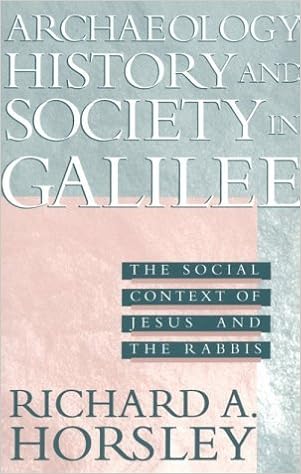This study of the history and culture of the land of Galilee claims that the land was one that was one made up of hill people who generally eschewed political alignment. That is, when Israel first ruled the land, the people who settled in the hills of Galilee tried hard to avoid coming too heavily under the influence of the Israelite kings (in fact, largely ignoring them). The situation continued to be the case as others took over the land. When Assyria invaded and deported the northern kingdom of Israel, Horsley claims, the Galilean hill people largely remained. When Greeks and Romans invaded, they didn't bother too much with Galilean hill people. And when the Jews took over the land, again, the Galilean hill people remained intransigent--not so interested in the Jewish temple culture. That said, because so many were Zebulonites and Asherites, they had a certain common heritage, which meant that they didn't have too much of a hard time fitting in with the Jewish overseers, save that they didn't want to pay taxes to help support the temple or to fall in line with Pharisaic rules. Increasing taxes--not only to the Romans but also to the client Herods--led to eventual rebellion in Galilee.
The rural people differed, in this respect, from those in the cities, which were much more Gentile in their orientation, as they were founded for and/or by Gentiles.
After the destruction of Jerusalem, Pharisaical Jewish elements moved into Galilee, and it became the center for rabbinic Judaism. But Horsley notes that this was a later phenomenon, one that we tend to let color our views of earlier Galilee.
The study is an interesting one, but I'm not sure Horsley's views are shared by that many. I've started reading another book, where the author argues that Galilee was largely Jewish in New Testament times, but he, too, is arguing against yet others who have argued that the area was to a large extent a mix of peoples, including many Gentiles.
Subscribe to:
Post Comments (Atom)







No comments:
Post a Comment